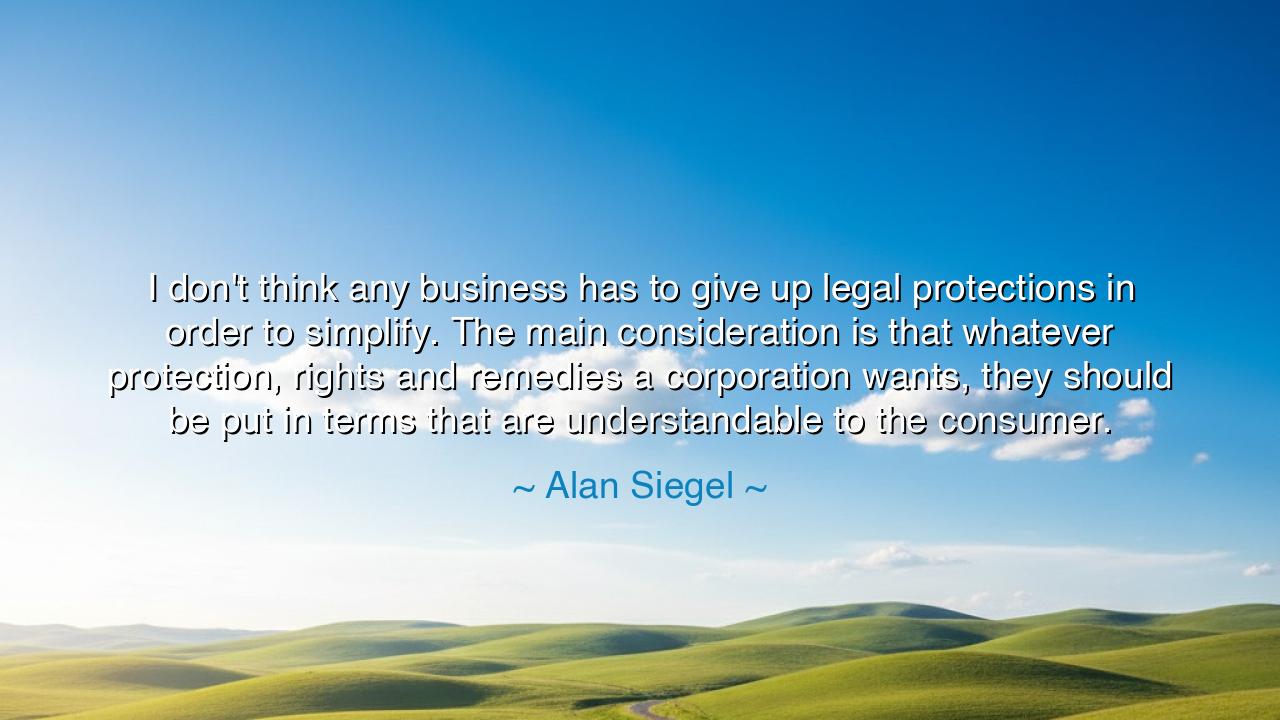
I don't think any business has to give up legal protections in
I don't think any business has to give up legal protections in order to simplify. The main consideration is that whatever protection, rights and remedies a corporation wants, they should be put in terms that are understandable to the consumer.






In the marketplace of words and promises, where trust is the invisible currency that sustains all trade, Alan Siegel stands as a rare voice calling for clarity. When he said, “I don't think any business has to give up legal protections in order to simplify. The main consideration is that whatever protection, rights and remedies a corporation wants, they should be put in terms that are understandable to the consumer,” he was not merely speaking of contracts or fine print. He was speaking of honesty, of the sacred bond between those who create and those who consume, between institutions and individuals. His words echo a timeless truth: simplicity is not weakness, and transparency is the highest form of respect.
In ancient times, kings would seal their decrees with symbols few could read. Power hid behind language, and ignorance became the instrument of control. Today, much the same veil lingers — not in scrolls, but in the small print of modern contracts, the labyrinth of legal terms that few can navigate. Siegel, a master of corporate communication and design, sought to pierce that veil. His belief was revolutionary not in technology, but in ethics: that businesses can protect themselves without deception, that complexity should never be used as a weapon against understanding. For to confuse the people you serve is to betray them quietly, with ink instead of chains.
This wisdom is not new. The philosopher Confucius once said, “If language is not correct, then what is said is not what is meant; if what is said is not what is meant, affairs cannot succeed.” The ancients understood that clarity of speech is the foundation of harmony. In every civilization, the decay of trust began with the corruption of words. Siegel’s mission — to simplify — was not about aesthetics, but about restoring that ancient harmony between truth and communication, between protection and fairness. He teaches that the law should not be a fortress against the people, but a bridge that connects both sides in mutual understanding.
We see the cost of neglecting this principle in countless modern stories. Consider the 2008 financial crisis, born partly from agreements so complex that even their signers could not comprehend their meaning. Hidden within the ornate language of contracts were traps — adjustable rates, bundled risks, shifting terms — and millions fell not because they were reckless, but because they were deceived by complexity. Here, Siegel’s words rise like a warning from the ruins: complexity that serves confusion is not sophistication; it is corruption disguised as intellect.
Yet Siegel’s vision does not call for the abandonment of protection. He does not preach naivety or recklessness. His wisdom lies in balance — that legal strength and human understanding can coexist. The law can remain firm while its language becomes humane. In his philosophy, simplicity is not the enemy of safety, but its greatest ally, for only what is understood can be respected, and only what is respected can endure. Just as a wise teacher explains a profound truth in simple words, so too should a corporation speak in ways that all can comprehend.
Imagine a world where every agreement, every policy, every promise of service is written not to obscure, but to enlighten. The relationship between business and consumer would transform from suspicion to trust. The ink of contracts would become a tool of mutual empowerment rather than manipulation. This, perhaps, is what Siegel envisioned — a civilization of clarity, where language becomes a force for justice, and where simplicity serves both sides of the table.
To those who hear this teaching, take it as more than advice — take it as a moral calling. Whether you write, teach, sell, or govern, let your words be clear, truthful, and merciful. Do not hide meaning in the shadows of jargon. Speak so that even the humblest listener can understand you fully. For in every profession, clarity is kindness, and honesty is the highest art. The wise do not simplify because they must, but because they honor those who listen.
Thus, the legacy of Alan Siegel is not about contracts or corporations, but about integrity in communication. His is a reminder that power does not need confusion to endure; it needs only fairness to be respected. Let us then speak plainly, act transparently, and build trust not on cleverness, but on clarity. For a world that speaks truth in simple terms is a world that cannot be deceived — and therefore, a world that will endure.






AAdministratorAdministrator
Welcome, honored guests. Please leave a comment, we will respond soon